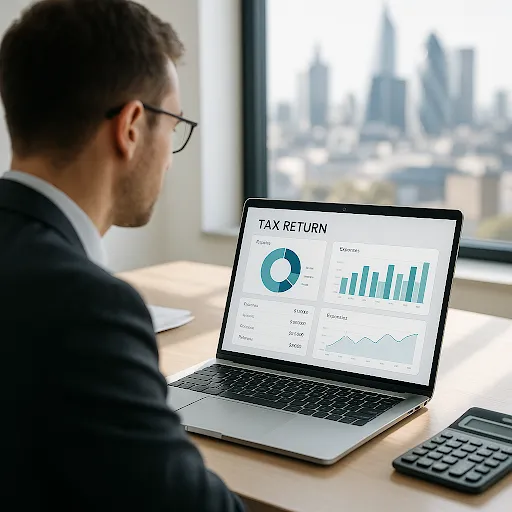A Tax Return Accountant helps businesses meet HMRC rules and avoid penalties. They handle Self Assessment and company tax returns while keeping records organised and compliant.
TL;DR / Key Takeaways
- UK businesses rely on tax return accountants to navigate HMRC Self Assessment rules, deadlines, and penalties.
- A dedicated tax return accountant provides accuracy, proactive reminders, and time-saving support across sole traders, partnerships, and limited companies.
- Professional handling reduces penalties, maximises eligible reliefs, and offers predictable pricing.
- London firms combine local knowledge with cloud tools for real-time visibility and collaboration.
- Typical process: data collection, preparation, review, submission, and ongoing tax planning.
What is a tax return accountant and why it matters for compliance
A tax return accountant ensures correct filing and deadline adherence. They apply tax rules to specific business situations, reducing errors and penalty risk.
Why businesses need expertise beyond DIY filing DIY forms miss reliefs and create errors. An expert finds allowable expenses and applies reliefs correctly. That saves money and avoids HMRC queries.
How HMRC deadlines and Self Assessment drive demand
Deadlines create urgency for accurate filing. Paper returns are due on 31 October 2025, online returns and payments on 31 January 2026, and new filer registration by 5 October 2025.
Penalty basics and practical impact Late filing triggers a fixed £100 penalty, followed by further charges. Accountants manage schedules and reminders to prevent those fines.
The role of HMRC tools and self-assessment processes
Accountants use HMRC portals and client permissions to submit returns. Clients can view status through their HMRC personal tax account or authorised agent access.
What makes a tax return accountant valuable for compliance
They ensure accuracy, prevent penalties, and provide ongoing tax planning. Timely reminders and year-round reviews materially reduce audit risk. Accountants also liaise with HMRC on behalf of clients.
Core services for various business structures
Sole traders & partnerships: Self Assessment returns, expense tracking, and relief guidance.
Limited companies: Company tax returns, corporation tax calculations, and year-end reporting.
Contractors & freelancers: Expense categorisation, IR35 considerations, and quarterly reviews.
Digital records and cloud accounting integration Cloud software links bank feeds, invoices, and receipts for real-time figures. Interface Accountants use cloud tools for constant visibility and quick collaboration. (See service details)
Specific value-adds that support compliance
Fixed or predictable pricing reduces surprises. Unlimited support and proactive deadline alerts keep filings on track. Accountants review year-round financials to optimise tax positions.
How to choose the right tax return accountant near you
Pick a firm with local London experience, clear pricing, and HMRC expertise. Ensure they work with your cloud software and offer accessible communication.
How Interface Accountants aligns with these criteria Interface Accountants focuses on London businesses, offers fixed pricing with unlimited support, and uses cloud tools for transparency. Their local reputation emphasises responsiveness and reliability.
Quick onboarding checklist Ask about pricing, turnaround times, and data security. Prepare invoices, bank statements, payroll records, and previous filings before onboarding.
Cost, value, and ROI of hiring a tax return accountant
Fees vary by complexity and business type. Expect fixed-fee returns or an annual retainer for ongoing compliance.
Is hiring worth the expense? Time savings, fewer penalties, and better tax planning usually outweigh fees for most small businesses.
Process and workflow: how an accountant works with your business
Typical workflow: discovery call, document gathering, accountant preparation, client review, HMRC submission, and ongoing reminders. Onboarding often completes within weeks.
Real-life use cases (London focus)
Limited company example: accountant handled corporation tax and payroll filings, avoiding late penalties.
Sole trader example: expense categorisation increased deductible costs and reduced tax due.
Contractor example: proactive quarterly checks prevented an end-of-year scramble.
Quick-reference deadlines and comparison
- Paper returns: 31 October 2025
- Online returns/payment: 31 January 2026
- New filer registration: 5 October 2025
- Personal allowance (2025/26): £12,570
Accountant vs DIY (summary) Accountant: lower error risk, proactive planning, HMRC liaison. DIY: lower fees upfront, higher time cost and penalty risk.
FAQ
When are HMRC deadlines for 2025–26?
Paper: 31 Oct 2025; online and payment: 31 Jan 2026.
Do limited companies need to file tax returns?
Yes. Limited companies must file company tax returns with HMRC annually.
How much does a tax return accountant cost in the UK?
Costs vary; expect fixed fees or annual retainers depending on complexity.
How can an accountant prevent HMRC penalties?
They manage deadlines, check accuracy, and liaise with HMRC to resolve issues before fines apply.
Why hire Interface Accountants in London?
They combine local expertise, cloud tools, fixed pricing, and ongoing support.
What makes professional service better than DIY?
Professionals reduce error risk and find reliefs you might miss.
How to get started
Request a quote or schedule a meeting via the tax returns service page. Expect fast onboarding and a named accountant.
Summary
A Tax Return Accountant eases HMRC compliance, reduces errors, and protects businesses from penalties. For London firms, cloud-based accountants like Interface Accountants deliver local knowledge, fixed pricing, and year-round support for predictable tax outcomes.
 Skip to content
Skip to content


